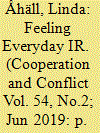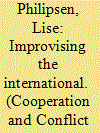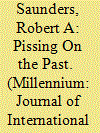|
|
|
Sort Order |
|
|
|
Items / Page
|
|
|
|
|
|
|
| Srl | Item |
| 1 |
ID:
166888


|
|
|
|
|
| Summary/Abstract |
This article explores affective, embodied encounters between military and civilian bodies in the everyday as choreography of war. It argues that by paying attention to the intersecting political sphere of bodies, affect and movement – through the metaphor of ‘dance’ – we are not only able to understand how security operates as a logic reproducing the militarisation of the everyday, but also able to identify a representational gap, an aesthetic politics, potentially useful for resistance to such practices normalising war in the everyday. It draws on two British examples of where military moves disrupt civilian spaces in the everyday: an arts project commemorating the Battle of the Somme, and a football game taking place during Remembrance week. Through embodied choreographies of war in the everyday, dance is used as a metaphor to understand militarisation as an example of feeling Everyday IR. Thus, dance is useful to ‘see’ the politics of Everyday IR, but also to understand, to feel and possibly to resist the politics of normalisation of war in the everyday. This is one example of how feeling Everyday IR offers alternative openings into political puzzles of security logics informing war as practice.
|
|
|
|
|
|
|
|
|
|
|
|
|
|
|
|
| 2 |
ID:
173739


|
|
|
|
|
| Summary/Abstract |
In this article, I argue that the introduction of ethnography to International Relations has not taken full advantage of the potential of bringing these two fields together. Using international intervention as an example, I suggest that to bring out this potential we need to be more attentive to the classical virtues of ethnography. This means taking the subjects of our studies much more seriously, as people capable of making sense of and reacting to the structures of power they are embedded in. Here implementers tasked to put international policies into action in relation to a concrete context provide an overlooked source of knowledge. Using their experiences, reflections and ways of dealing with the concrete dilemmas that arise in their daily work enables us to analyse intervention as concrete relations of power that play out, affect and are mitigated by people in the field. Seeing knowledge as in this manner arising from the field provides a deeper knowledge that is necessary if we want to read intervention not only as an exertion of power from the international to the local, but as dynamically reshaped, resisted and made sense of in the field.
|
|
|
|
|
|
|
|
|
|
|
|
|
|
|
|
| 3 |
ID:
167420


|
|
|
|
|
| Summary/Abstract |
When and where one can urinate is increasingly politicised around the globe. As an example of bio-political power, the provision, regulation and access to public toilets reflects larger structures in any given society. However, there is another side to micturition, that is the use of urine as a manifestation of bodily power over another/others. This article analyses the politics of the urinal through a close reading of the men’s toilet in The Lismore pub in Partick, Scotland, thus bringing together these two threads via the concept of everyday effigial resistance. In our interrogation of a politicised urinal that asks users to ‘piss’ on historical figures associated with the Highland Clearances, we aim to push International Relations to follow Enloe’s call for the study of ‘mundane practices… and the most intimate spaces’ by considering the most banal aspects of the human condition as part of its remit. Our case study serves as an explicit political intervention, one which through its geographic and geopolitical scales makes an argument for engaging with the mundane, vernacular and vulgar in everyday IR.
|
|
|
|
|
|
|
|
|
|
|
|
|
|
|
|
|
|
|
|
|